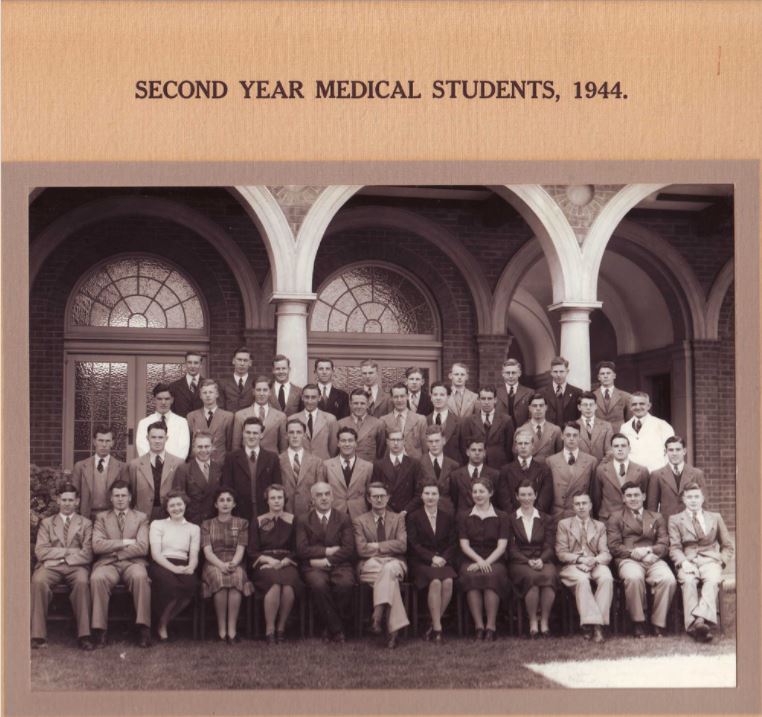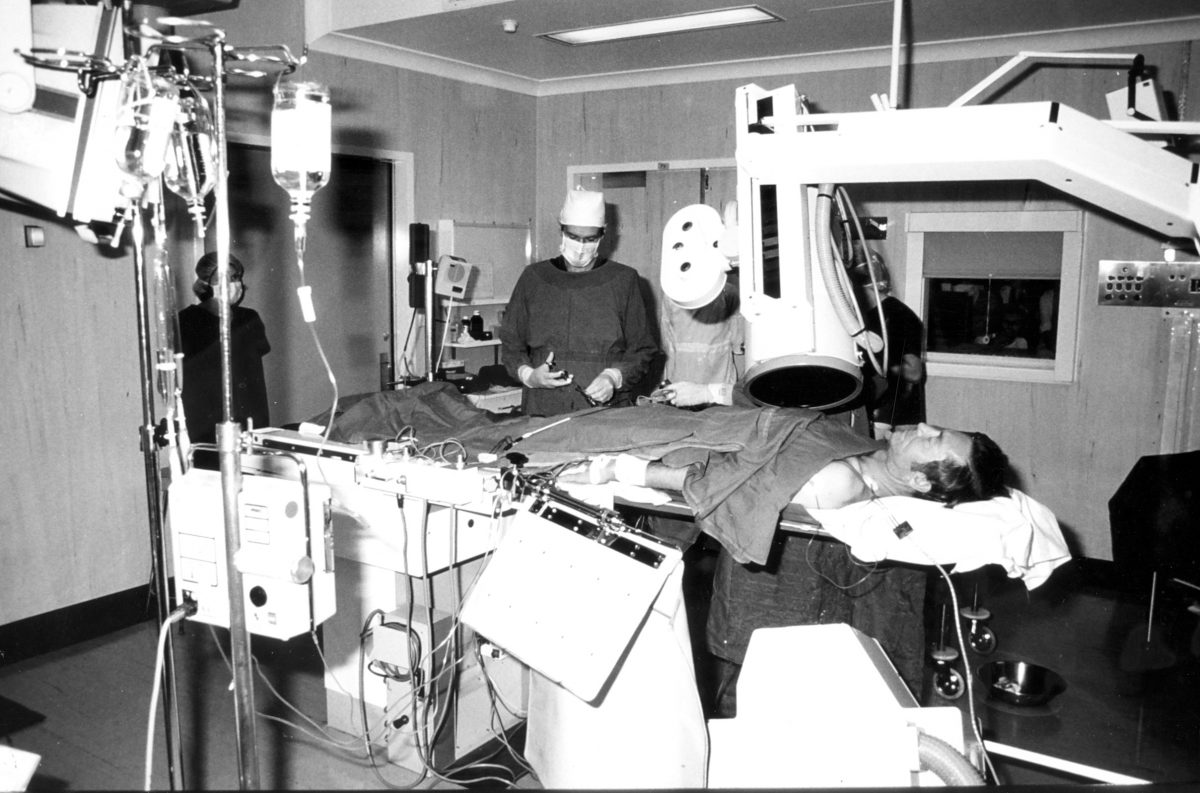Dr Hetzel was born in 1924 in London, where his father was undertaking post-graduate medical studies. Educated at Kings College and St Peter’s College in Adelaide, he entered the University of Adelaide in 1943, as a student in the Medical School. After his final examinations for the MB BS degree, Peter attended a student conference in Sri Lanka. He then returned to the Royal Adelaide Hospital as a Resident Medical Officer (1949).

My first position in the Adelaide was in Frome ward, Tuberculosis ward … There was extra food for the nursing staff and as an RMO I could have morning tea with the nursing staff and we had bread and butter and marmite and everything that was supposed to be nutritious.
Dr Peter Hetzel, Oral History 2006
In the following year Dr Hetzel worked for six months at the Adelaide Children’s Hospital, followed by an appointment as a Research Officer at the Institute of Medical and Veterinary Science. In 1952 he won a fellowship for study at the Mayo Clinic in Rochester, Minnesota, USA.
From there I went to the Children’s Hospital. The arrangements were that you could get a position for six months at the Children’s Hospital and then somebody else got the next six months because, of course, there were not a lot of positions then … I enjoyed paediatrics and I seriously considered becoming a Paediatrician … When I had finished at the Children’s I wasn’t absolutely sure what I wanted to do … There was a position advertised by the Institute of Medical and Veterinary Science for a Surgical Research Officer to carry out research on Dextran … well, I got the position and spent sixteen months as a Surgical Research Officer.
Dr Peter Hetzel, Oral History 2006
From 1953 to 1956, Dr Hetzel spent the majority of his time at the Mayo Clinic where he gained experience in cardiology in the Catheter Laboratories. He was a member of the team which pioneered open heart surgery using a pump oxygenator in its first clinical application (1955). At the end of 1956 he went to London to study under a Fellowship awarded by the Grocer’s Company.
Overall I spent two and a half years of the five years in Rochester. In that time I prepared a monograph for publication about the use of the Indicator Dilution Technique for measuring cardiac output and for its diagnostic purposes … then I felt that I wanted to have more training. My father wrote to me and said that there was a Scholarship from the Grocers’ Company for someone who was not English trained to get further training and research before returning to Australia … I arrived back in London at the end of December 1956 – having been awarded the Grocers’ Company Medical Research Fellowship.
Dr Hetzel, Oral History 2006
While in London, he worked as a Research Registrar at the Brompton Hospital, working with pioneers in open heart surgery; the use of defibrillators and hypothermia for surgery on atrial-septal defects. “I shared in the ward rounds, I worked in the clinic and I also worked in the Catheter Laboratory.”
During this time, he passed the examination for membership of the Royal College of Physicians. After considering taking an appointment as Senior Registrar at the Brompton Hospital, Dr Hetzel decided to return to South Australia. He returned to the Royal Adelaide Hospital in 1958.
Back home, he became involved in the development of Cardiac Catheterization, in association with Dr Hugh Gilmore.
Hugh had started catheterising and had the equipment and I joined him and we both started doing cardiac catheterisations. Well, he had done a few, but we started to do more. The room we used was G12 on the ground floor of the McEwin. We had the room on the corner given to us; one of the first tasks I had was to turn it into a laboratory.
Dr Hetzel, Oral History 2006
As a result of his experience in America, Dr Hetzel took a leading role in the development of open heart surgery at Royal Adelaide Hospital. In 1959 he was appointed Director of the Cardiovascular Investigation Unit (1960-1985)
I was finally appointed in January 1960 to the position of Director of Cardiovascular Investigator Unit. It was a term chosen by Mr Rankin [Hospital Administrator]. It later became the Cardiopulmonary Investigation Unit until 1972 when it reverted back to Cardiovascular Investigation Unit.
Dr Hetzel, Oral History 2006

Dr Hetzel was Clinical Senior Lecturer in Medicine, University of Adelaide (1980-1989). During his period as President of the South Australian Salaried Medical Officers Association, he established a superannuation fund for visiting medical officers.
I became President of the South Australian Salaried Medical Officers Association, which was the organisation which was basically set up a few years before to look after the affairs of all the doctors employed by the government.
Dr Peter Hetzel, Oral History 2006
Dr Hetzel retired from the hospital in 1990. He continued seeing patients in private practice until December 2002 at age seventy-eight. Back in 1968, Dr Hetzel had begun taking on the occasional medical-legal cases and once retired from clinical practice continued the work “I enjoy it and I believe it is important to be challenged, it takes a long time some of it [cases], because you have to work out what can happen.”
Occasionally patients would say to me and there were a few of them. They would say on their way out of the consulting room, they’d say ‘Dr Hetzel, I know and you have explained to me what I have got and you not being able to anything to alter things very much, but to me it has been a great help to come and talk to you and I feel better now than I did before I arrived’. When someone says that, that is perhaps the greatest compliment that anyone could pay you.
Dr Hetzel, Oral History 2006
“I stepped down from being Director of the Cardiovascular Investigation Unit, as it was back being called, in January 1985. I had been in the position for twenty-five years and I thought it was an appropriate time. I was now sixty and therefore I wanted to continue in the hospital, and it was possible then for me to move across and become a senior visiting specialist, working in the ward and the clinic and not working any more in the laboratory.”
Dr Hetzel, Oral History 2006
He continued his connection with the Royal Adelaide Hospital, becoming a part of the hospital’s Heritage Committee. In 2008, he was appointed Chair of the Committee (now called the CALHN Health Museum), a position he held until his death in 2020.
Written by Margot Way, CALHN Health Museum
(Information sourced from Trove, History Trust, Ancestry, State Library of South Australia and SA Health Museum collection. Copies of all newspaper articles and other relevant documents are available on request).